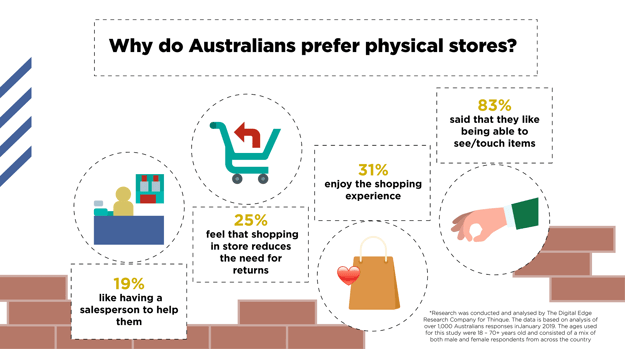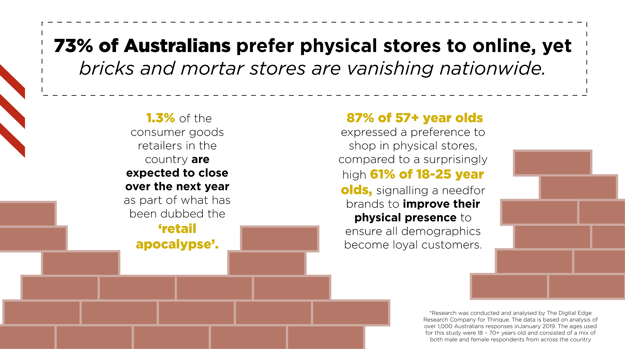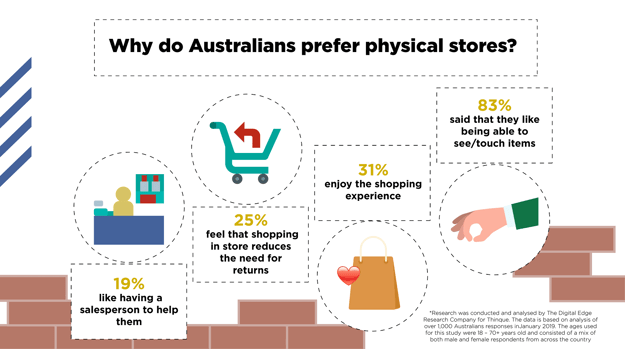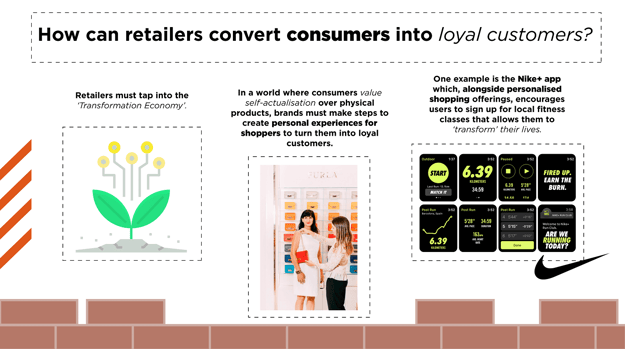Foresights and ideas that expand minds and inspire a change of heart.

Do you prefer physical stores to online shops? If so, I’m sure you’ll have noticed the fact that brands across the globe are sadly shutting down their physical stores, instead choosing to migrate their offerings online, contributing to what has been dubbed the ‘retail apocalypse’.

This news will be disconcerting for our Australian readers who, according to new research by our think tank - Thinque,* revealed that they (supposedly) prefer shopping in physical stores over their online counterparts (73%). For those outside Australia, do you think this analogue preference is true in your country too?
With this number in mind, how can it be that while consumers say they prefer physical over virtual, the economic viability of bricks and mortar is evidently under attack by digital consumption habits? Do we as consumers not act on our supposed preferences? Is this the reason Steve Jobs mistrusted focus groups and Henry Ford once famously (and supposedly) said that: “If I had asked people what they wanted, they would have said faster horses.” Are consumers showing signs of nostalgia yet failing to back their supposed preferences with their money?
When we broke the research down further, it showed us that 87% of 57+ year olds agreed that they preferred physical over online stores, compared to a surprising 61% of 18-25 year olds.

When looking at the research closer, it revealed that the reasons behind Aussies’ preference for physical stores was: 83% like being able to see/touch items, 31% enjoy the shopping experience, 25% feel that shopping in-store reduces the need for returns, whilst 19% like having a salesperson help them.***
Our research clearly shows that Australians prefer physical stores, yet despite this they are still moving to using online stores more. Maybe this is a case of digital minds trumping over analogue hearts? As such, it is time for retailers to understand they are now no longer just in an Experience Economy, but in an emerging Transformation Economy.
The idea behind the Transformation Economy sees brands sell consumers the promise of personal achievement over and above material possessions. In this climate, consumers are looking to connect with brands on a deeper level, allowing them to undergo an actual transformation, rather than simply purchasing a product. One early example of this was Nike. With the launch of the Nike+ app, Nike began to offer users the option to book one-on-one appointments with sales assistants at local stores, as well as encourage them to sign up for local running or fitness classes, all while becoming part of the Quantified Self movement.
The app integrates with other Nike apps, including Nike+ Run Club and Nike+ Training Club, allowing the brand to gather further data on each customer, which also enables them to offer even more personalised content and offers, while encouraging users to ‘manage what can be measured’ and offer constant improvement. By providing the option for customers to ‘transform’ their life through their offering, Nike is a prime example of a brand making waves in the Transformation Economy. By offering data in return, consumers are enabled to use the app to help make keeping fit a richer personal experience.
To help prepare your brand for the impending Transformation Economy, sign up for my upcoming webinar on the Future of Branding here. Spots are limited, so make sure you register quickly.
Lululemon: In order to tap into the Transformation Economy, brands need to offer consumers an emotional experience that will enhance their lives. One example is Lululemon, who opened pop up shops and buses that offer yoga and meditation for consumers alongside their product offerings, a great example of how brands must focus on creating memorable events for their customers, with the transformational experience itself becoming the product.

Naked Wines: Naked Wines tapped into the Transformation Economy by allowing customers to choose between buying wine on a one-off basis or becoming (investment) ‘Angels’ who venture-fund the product and benefit from discounts. By empowering independent winemakers to focus on making the best wine possible, Naked Wines also fostered loyalty amongst consumers by making them feel as though they matter by helping to support independent winemakers over larger retailers. Allowing consumers to feel as though they are doing ‘transformational good’ will be crucial in nurturing consumer relationships in the emergent Transformation Economy.
The question is - is your brand already enabling transformation, and if so, how are you communicating this convincingly? If you are not already part of the Transformation Economy, your brand needs to transform today.
To learn more about the different programs we run for companies to amplify their brand signal, check out our Brand Ambassador Case Studies and get in touch today.
* https://www.insideretail.com.au/news/australias-vanishing-stores-201804
**Research was conducted and analysed by The Digital Edge Research Company for Thinque. The data is based on analysis of over 1,000 Australians responses in January 2019. The ages used for this study were 18 – 70+ years old and consisted of a mix of both male and female respondents from across the country.
*** Respondents were able to select multiple answers.

Header Text
Lorem ipsum dolor sit amet, consectetur adipiscing elit, sed do eiusmod tempor incididunt ut labore et dolore magna aliqua. Ut enim ad minim veniam, quis nostrud exercitation ullamco laboris nisi ut aliquip ex ea commodo consequat. Duis aute irure dolor in reprehenderit in voluptate velit esse cillum dolore eu fugiat nulla pariatur.
Lorem ipsum dolor sit amet, consectetur adipiscing elit, sed do eiusmod tempor incididunt ut labore et dolore magna aliqua. Ut enim ad minim veniam, quis nostrud exercitation ullamco laboris nisi ut aliquip ex ea commodo consequat. Duis aute irure dolor in reprehenderit in voluptate velit esse cillum dolore eu fugiat nulla pariatur.
Lorem ipsum dolor sit amet, consectetur adipiscing elit, sed do eiusmod tempor incididunt ut labore et dolore magna aliqua. Ut enim ad minim veniam, quis nostrud exercitation ullamco laboris nisi ut aliquip ex ea commodo consequat. Duis aute irure dolor in reprehenderit in voluptate velit esse cillum dolore eu fugiat nulla pariatur.

Header Text
Lorem ipsum dolor sit amet, consectetur adipiscing elit, sed do eiusmod tempor incididunt ut labore et dolore magna aliqua. Ut enim ad minim veniam, quis nostrud exercitation ullamco laboris nisi ut aliquip ex ea commodo consequat. Duis aute irure dolor in reprehenderit in voluptate velit esse cillum dolore eu fugiat nulla pariatur.
Lorem ipsum dolor sit amet, consectetur adipiscing elit, sed do eiusmod tempor incididunt ut labore et dolore magna aliqua. Ut enim ad minim veniam, quis nostrud exercitation ullamco laboris nisi ut aliquip ex ea commodo consequat. Duis aute irure dolor in reprehenderit in voluptate velit esse cillum dolore eu fugiat nulla pariatur.
Lorem ipsum dolor sit amet, consectetur adipiscing elit, sed do eiusmod tempor incididunt ut labore et dolore magna aliqua. Ut enim ad minim veniam, quis nostrud exercitation ullamco laboris nisi ut aliquip ex ea commodo consequat. Duis aute irure dolor in reprehenderit in voluptate velit esse cillum dolore eu fugiat nulla pariatur.

Header Text
Lorem ipsum dolor sit amet, consectetur adipiscing elit, sed do eiusmod tempor incididunt ut labore et dolore magna aliqua. Ut enim ad minim veniam, quis nostrud exercitation ullamco laboris nisi ut aliquip ex ea commodo consequat. Duis aute irure dolor in reprehenderit in voluptate velit esse cillum dolore eu fugiat nulla pariatur.
Lorem ipsum dolor sit amet, consectetur adipiscing elit, sed do eiusmod tempor incididunt ut labore et dolore magna aliqua. Ut enim ad minim veniam, quis nostrud exercitation ullamco laboris nisi ut aliquip ex ea commodo consequat. Duis aute irure dolor in reprehenderit in voluptate velit esse cillum dolore eu fugiat nulla pariatur.
Lorem ipsum dolor sit amet, consectetur adipiscing elit, sed do eiusmod tempor incididunt ut labore et dolore magna aliqua. Ut enim ad minim veniam, quis nostrud exercitation ullamco laboris nisi ut aliquip ex ea commodo consequat. Duis aute irure dolor in reprehenderit in voluptate velit esse cillum dolore eu fugiat nulla pariatur.
& STAY UP TO DATE WITH FORESIGHTS AND TREND REPORTS!
WE WILL EQUIP YOU WITH THE VIDEOS AND MATERIALS YOU NEED TO SUCCESSFULLY PITCH ASN.
0 Comment